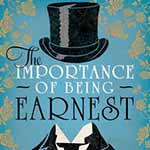






Principals
John Worthing
Algernon Moncrieff
Rev. Canon Chasuble
Merriman
Lane
Lady Bracknell
Hon. Gwendolen Fairfax
Cecily Cardew
Miss Prism
Get your license from Samuel French
All of Thespis costumes are either vintage or specially made to reflect the selected periods. You can be sure when hiring from Thespis Theatrical Costumiers that you will look amazing in any of the costume for "The Importance Of Being Ernest" costume hire from our extensive collection, where our reputation for quality, cleanliness and high standard of replication is second to none. Thespis Theatrical Costumiers continue to excel in bringing high quality costume hire on to the stage. Our costumes supplied will reflect the period in The Importance Of Being Ernest correctly. The Importance of Being Earnest, A Trivial Comedy for Serious People is a play by Oscar Wilde. First performed on 14 February 1895 at the St James's Theatre in London, it is a farcical comedy in which the protagonists maintain fictitious persons to escape burdensome social obligations. Working within the social conventions of late Victorian London, the play's major themes are the triviality with which it treats institutions as serious as marriage, and the resulting satire of Victorian ways. Contemporary reviews all praised the play's humour, though some were cautious about its explicit lack of social messages, while others foresaw the modern consensus that it was the culmination of Wilde's artistic career so far. Its high farce and witty dialogue have helped make The Importance of Being Earnest Wilde's most endearingly popular play. Don't compromise on your costume hire for your next show give us a call.
Act One - Three Act Version Algernon Moncrieff's flat in Half Moon Street, W The play opens with Algernon Moncrieff, an idle young gentleman, receiving his best friend, John Worthing, whom he knows as Ernest. Ernest has come from the country to propose to Algernon's cousin, Gwendolen Fairfax. Algernon, however, refuses his consent until Ernest explains why his cigarette case bears the inscription, "From little Cecily, with her fondest love to her dear Uncle Jack." 'Ernest' is forced to admit to living a double life. In the country, he assumes a serious attitude for the benefit of his young ward, the heiress Cecily Cardew, and goes by the name of John (or, as a nickname, Jack), while pretending that he must worry about a wastrel younger brother named Ernest in London. In the city, meanwhile, he assumes the identity of the libertine Ernest. Algernon confesses a similar deception: he pretends to have an invalid friend named Bunbury in the country, whom he can "visit" whenever he wishes to avoid an unwelcome social obligation. Jack refuses to tell Algernon the location of his country estate. Gwendolen and her formidable mother Lady Bracknell now call on Algernon who distracts Lady Bracknell in another room while Jack proposes to Gwendolen. She accepts, but seems to love him very largely for his professed name of Ernest. Jack accordingly resolves to himself to be rechristened "Ernest". Discovering them in this intimate exchange, Lady Bracknell interviews Jack as a prospective suitor. Horrified to learn that he was adopted after being discovered as a baby in a handbag at Victoria Station, she refuses him and forbids further contact with her daughter. Gwendolen, though, manages covertly to promise to him her undying love. As Jack gives her his address in the country, Algernon surreptitiously notes it on the cuff of his sleeve: Jack's revelation of his pretty and wealthy young ward has motivated his friend to meet her. The Importance Of Being Ernest Costumes
Act Two The Garden of the Manor House, Woolton Cecily is studying with her governess, Miss Prism. Algernon arrives, pretending to be Ernest Worthing, and soon charms Cecily. Long fascinated by Uncle Jack's hitherto absent black sheep brother, she is predisposed to fall for Algernon in his role of Ernest (a name she, like Gwendolen, is apparently particularly fond of). Therefore, Algernon, too, plans for the rector, Dr. Chasuble, to rechristen him "Ernest". Jack, meanwhile, has decided to abandon his double life. He arrives in full mourning and announces his brother's death in Paris of a severe chill, a story undermined by Algernon's presence in the guise of Ernest. Gwendolen now enters, having run away from home. During the temporary absence of the two men, she meets Cecily, each woman indignantly declaring that she is the one engaged to "Ernest". When Jack and Algernon reappear, their deceptions are exposed.
Act Three Morning-Room at the Manor House, Woolton Arriving in pursuit of her daughter, Lady Bracknell is astonished to be told that Algernon and Cecily are engaged. The revelation of Cecily's trust fund soon dispels Lady Bracknell's initial doubts over the young lady's suitability, but any engagement is forbidden by her guardian Jack: he will consent only if Lady Bracknell agrees to his own union with Gwendolen—something she declines to do. The impasse is broken by the return of Miss Prism, whom Lady Bracknell recognises as the person who, twenty-eight years earlier, as a family nursemaid, had taken a baby boy for a walk in a perambulator (baby carriage) and never returned. Challenged, Miss Prism explains that she had absentmindedly put the manuscript of a novel she was writing in the perambulator, and the baby in a handbag, which she had left at Victoria Station. Jack produces the very same handbag, showing that he is the lost baby, the elder son of Lady Bracknell's late sister, and thus indeed Algernon's elder brother. Having acquired such respectable relations, he is acceptable as a suitor for Gwendolen after all. Gwendolen, though, still insists that she can only love a man named Ernest. What is her fiancé's real first name? Lady Bracknell informs Jack that, as the first-born, he would have been named after his father, General Moncrieff. Jack examines the army lists and discovers that his father's name—and hence his own real name—was in fact Ernest. Pretence was reality all along. As the happy couples embrace—Jack and Gwendolen, Algernon and Cecily, and even Dr. Chasuble and Miss Prism—Lady Bracknell complains to her newfound relative: "My nephew, you seem to be displaying signs of triviality." "On the contrary, Aunt Augusta", he replies, "I've now realised for the first time in my life the vital importance of being Earnest." The Importance Of Being Ernest Costumes
Trivia: Bunburying Bunburying is a stratagem used by people who need an excuse for avoiding social obligations in their daily life. The word "bunburying" first appears in Act I when Algernon explains that he invented a fictional friend, a chronic invalid named "Bunbury", to have an excuse for getting out of events he does not wish to attend, particularly with his Aunt Augusta (Lady Bracknell). Algernon and Jack both use this method to secretly visit their lovers, Cecily and Gwendolen.
"Stand Out In The Footlights"